
Each year when fall rolls around, the networks bring forth their newest TV endeavors, hoping to impress and excite viewers with a creative premise or a compelling set of characters. With a little luck, the viewers will get both. However, inevitably there are some quickly cancelled failures or characters that make us cringe week in and week out—and not in the way that Girls makes us cringe while laughing uncontrollably.
At TV Blend, we know it’s not all black and white. Sometimes a great show can feature an unconvincing character, sometimes a bland show’s scales can be tipped toward terrible by a poorly written man or woman (or alien), and sometimes even the worst shows can have a stand-out low point. This year, instead of celebrating the worst of the worst new programs on TV, we’d like to get out our shiny microscope and dig in a little deeper, taking a look at the brand new characters that just don’t work. We combed through the worst of the best and the worst of the worst, arguing and shouting along the way, until we narrowed the list to five (in no specific order). Without further ado, here are the worst characters of 2012.
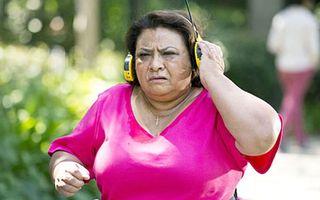
1. Fausta From NBC’s Go On
Go On is my favorite new show on television. It’s the only program I ever bother to tune in live for (well, sans The Amazing Race). But Go On has a problem. The show’s large ensemble cast in the support group means we have a lot of one-note characters. There’s the terrifying cat lady, Sonia, and the introvert-turned-extrovert kid, Owen. However, the worst offender is Tonita Castro’s Fausta, a character that seems to have been brought in only to provide a multi-ethnic atmosphere and be the brunt of a few jokes.
In everyday life, Fausta would probably be a likeable enough human, willing to be part of a team and make the best of certain situations. However, as a comedic character, Fausta is as useless as a door hinge without a door. Most of her laughs are earned through a recurring plotline where the woman will pretend her English is not so good when there’s something going on she does not want to here. This may have earned a smile the first time, but it’s not valuable currency, anymore.
It’s hard to fault Go On for it’s one-note characters, when most of the show’s characters (Ryan, Lauren, Carrie, Anne, and Steven) are top notch. It’s just that a little streamlining—or a little more work with the ensemble—could go a long way.
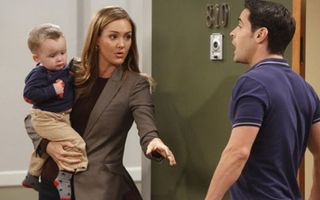
2. Sheila From NBC’s Guys With Kids
CINEMABLEND NEWSLETTER
Your Daily Blend of Entertainment News
Despite the less than promising promotional material, I really wanted to like Guys with Kids. As a big fan of Jimmy Fallon (and his Late Night), it was exciting to hear he'd be executive producing a series for NBC, but the series turned out to be a standard relationship based sitcom without much to do with fatherhood. It's hard enough to embrace the live studio audience and other dated trappings, but the show also contains (too many) clichéd characters poorly drawn from the era when the peacock was king. While all the actors are too good for the material, Jesse Bradford and Erinn Hayes are not nearly as successful in escaping the dreck as the other couples, and exes Chris and Shelia should probably both be in contention for the worst new characters on television.
Bradford's recently single father may be painfully plain, yet he's still a step up from Hayes' crazy ex-wife, who comes across as a one-dimensional rehash of Christa Miller's Jordan Sullivan from NBC's (and ABC's) Scrubs. They even look the same. I don't blame Hayes. The actress has been great on other comedies, including Children's Hospital; however, in Guys with Kids, Shelia is written as an unsympathetic, unoriginal and, worst of all, unfunny character. And being bottom of the barrel on Guys with Kids must place her pretty low on the overall TV list.
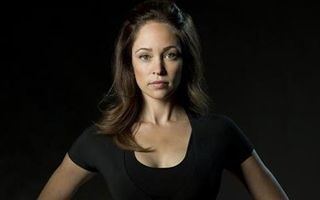
3. Kylie Sinclair From ABC’s Last Resort
One of the things I love most about ABC's Last Resort is the number of strong female characters featured in the series, which follows a U.S. military submarine crew trying to survive after falling under attack by its own government. Characters like Lt. Grace Shepard, and island residents Sophie Girard and Tani Tumrenjack strike me as particularly strong, sufficient women. The only issue I have with the show right now is Autumn Reeser's Kylie Sinclair, the weapons lobbyist.
Sinclair's like some kind of super-woman, full of knowledge and energy, rushing around trying to figure out what's going on, tracking down leads and looking for answers. I understand the point of the role and it seems likely that she'll play a big part in the plot of this series as it moves forward. But right now, Kylie comes on more than a little too strongly, which makes her seem unrealistic as a character. I like that she's beautiful, educated and confident. Those are her best traits and none of that should change. It's the execution that could be toned down a bit, if only to make her seem less primetime soap and more fitting to the rhythm of the otherwise excellent series.
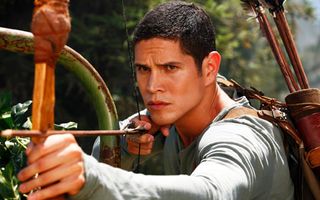
4. Nate from NBC’s Revolution
Revolution features a sparkling premise that borrows scenes from the futuristic “What if?” program Life After People. So far, I’ve bought in to the dazzling endeavor, investing in the survivalist attitude and kick-ass capabilities of most of the characters on the show. Except for Nate—the militia kid following around Charlie like a lovesick puppy dog. He’s meant to give the soulless machine that is the militia a little bit of heart, but so far he’s only managed to be a convenient plot device.
Yeah, I’m aware there was a pretty big, complicated reveal involving Nate at the end of last week’s episode, which we all probably should have seen coming a mile away (I didn’t). Even with some backstory on the kid revealed, he’s still more of a plot device than an actual character, showing up to add some tension to a scene and, inevitably, to save Charlie’s ass (Why can’t they just let the heroine save herself a time or two?). Revolution’s a really fun watch, but it’s about time Nate goes hard or goes to a more ‘heavenly’ home.
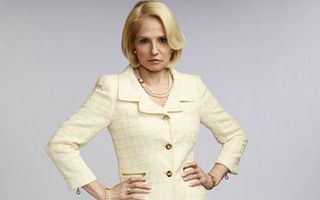
5. Jane Forrest from NBC’s The New Normal
In theory, Ellen Barkin’s Jane Forrest should be the biting, wickedly funny conservative pushback against liberal gay parents-to-be David and Bryan that The New Normal needs to offer a clever and honest take on the evolving nature of 21st Century families. Thanks to the obnoxious and aggressive bigotry she’s asked to spew on an episode-by-episode basis, she’s actually the very reason why the show falls somewhere closer to being a farce. She has only a thin connection with reality, and since she plays such a central role in the show, she impairs The New Normal’s ability to actually prove a point.
Let me give you an example. Earlier this year, the show devoted an episode to the upcoming real life presidential election. Given the basic premise of the show involves a gay couple having a child, it’s not surprising the half hour was ultimately pro-Obama, but by allowing an intelligent, well-spoken character a voice to support Romney, it came off as balanced and ultimately made the Obama endorsement stronger. Unfortunately, when it comes to gay rights, using Jane as a pushback doesn’t help anyone. When she openly rants about homosexuals destroying society in front of strangers, it makes everyone, conservatives and liberals, shrink in horror. It drowns any pointful message in her hate speech that would never escape the lips of an overwhelming majority of Christian, conservative women.
Sometimes less is more. If she reeled back twenty percent, she’d be fifty percent funnier and exponentially more useful as an example of how unattractive bigotry looks on everyone.
Most Popular






